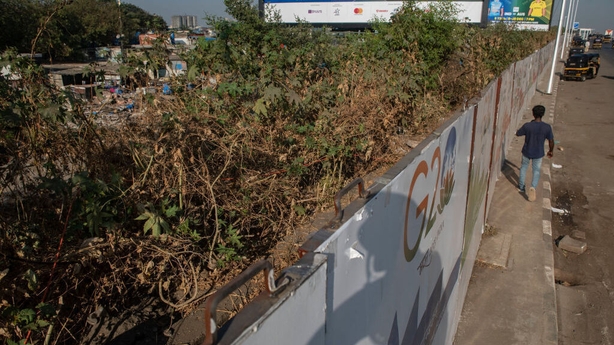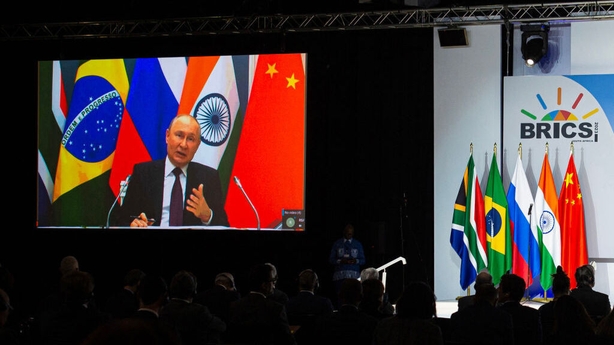Even the dogs on the street know it's a big deal.
The G20 summit in New Delhi this weekend is set to attract the biggest ever gathering of world leaders in the Indian capital.
As part of preparations for the summit, hundreds of stray dogs have been rounded up and taken off the streets of Delhi.
The Indian capital has over 60,000 stray dogs, which are generally looked upon fondly by Delhi’s 20 million residents, many of whom feed the animals.
And while the Municipal Corporation of Delhi did not directly link the removal of dogs to the summit, it’s part of a major clean-up operation, which has also seen the clearing of slums, and monkeys.
Similar denials have been put forward about slum clearance, with Narendra Modi’s government, which has carried out the demolitions, saying removal of illegal settlements is an ongoing activity.
Numerous slums were levelled around the Indian capital in recent months, with at least 49 demolition drives in New Delhi taking place between 1 April and 27 July, according to junior housing minister Kaushal Kishore.
In some instances, hoardings have been erected to hide the urban settlements from the view of foreign dignitaries.

But why is the G20 summit so important to India?
For starters, the calibre of the dignitaries attending.
US President Joe Biden will be attending as will British Prime Minister Rishi Sunak, controversial Saudi Crown Prince Mohammed Bin Salman, Canadian Prime Minister Justin Trudeau and Japanese Prime Minister Fumio Kishida among others.
But the absence of two world leaders in particular, may undermine the importance of the Delhi summit.
China’s President Xi Jinping, who has attended every G20 summit since taking office in 2013, will not travel to Delhi, sending his premier, Li Qiang, instead.
Reuters, citing foreign diplomats in China, previously reported that Xi's absence at the upcoming G20 could be a sign of Beijing's increasing coolness to the West and its allies.
The summit also risks being derailed by entrenched divisions over Russia’s invasion of Ukraine, stymying progress on global issues such as food security, debt distress and climate change.
President Vladimir Putin will not be in attendance and will be represented by Foreign Minister Sergei Lavrov.
At the meeting, or at least on its fringes, British Prime Minister Rishi Sunak is expected to urge his Indian counterpart, Narendra Modi to call out Russia over the war.
Western countries want a strong condemnation of the Russian invasion of Ukraine as a condition for agreeing to a Delhi declaration.
India has suggested that the G20, while condemning the suffering caused by Russia's invasion, also reflect Moscow and Beijing's view that the forum is not the place for geopolitics.
The divided stance on the war has prevented agreement on even a single communiqué at the ministerial meetings during India's G20 presidency so far this year, leaving it to the leaders to find a way around, if possible.
Both US and EU representatives have spoken of their willingness to support India to craft a communiqué, or joint statement of intention, at the end of the summit.
One area where it’s existentially important that progress is made by G20 members, is climate breakdown.
Earlier this week, Narendra Modi said that the leaders of the G20 summit must support developing countries to tackle climate change with more cash and by sharing technology.
Against a backdrop of record-breaking temperatures and deadly heatwaves across the globe, climate scientists and activists have warned of dire consequences - particularly for developing countries - if leaders fail to reach a consensus.
Modi has pitched India as a self-styled leader of the "Global South", a bridge between developed and developing countries.
Globally, wealthy nations missed their pledge to provide, by 2020, $100 billion a year in climate finance to poorer nations, eroding trust that polluters will help vulnerable countries least responsible for rising temperatures to tackle the challenges of climate change.
The Group of 20, which will meet in New Delhi this weekend, consists of 19 countries and the European Union, making up about 85% of global GDP, and a similar amount of its carbon emissions.
The shape of the Group is also shifting; the G20 has extended membership to the African Union.
The move gives the African Union, a continental body of 55 member states, the same status as the European Union - the only regional bloc with a full membership currently - up from its current designation of "invited international organization".
This coincides with the growth of another geopolitical group, BRICS, which comprises the economies of Brazil, Russia, India, China and South Africa.
Last week, Indian news website The Wire declared "BRICS is dynamic, G20 is not".

At its summit in South Africa in August, the grouping admitted six new members from the Middle East and South America, with many more nations from the Global South queueing up to join the relatively new organisation.
Furthermore, China’s Xi Jinping was front and centre at the BRICS summit, and as discussed earlier, will not be at the G20 summit.
Is this indicative of China’s focus on a new world order? It’s certainly telling.







